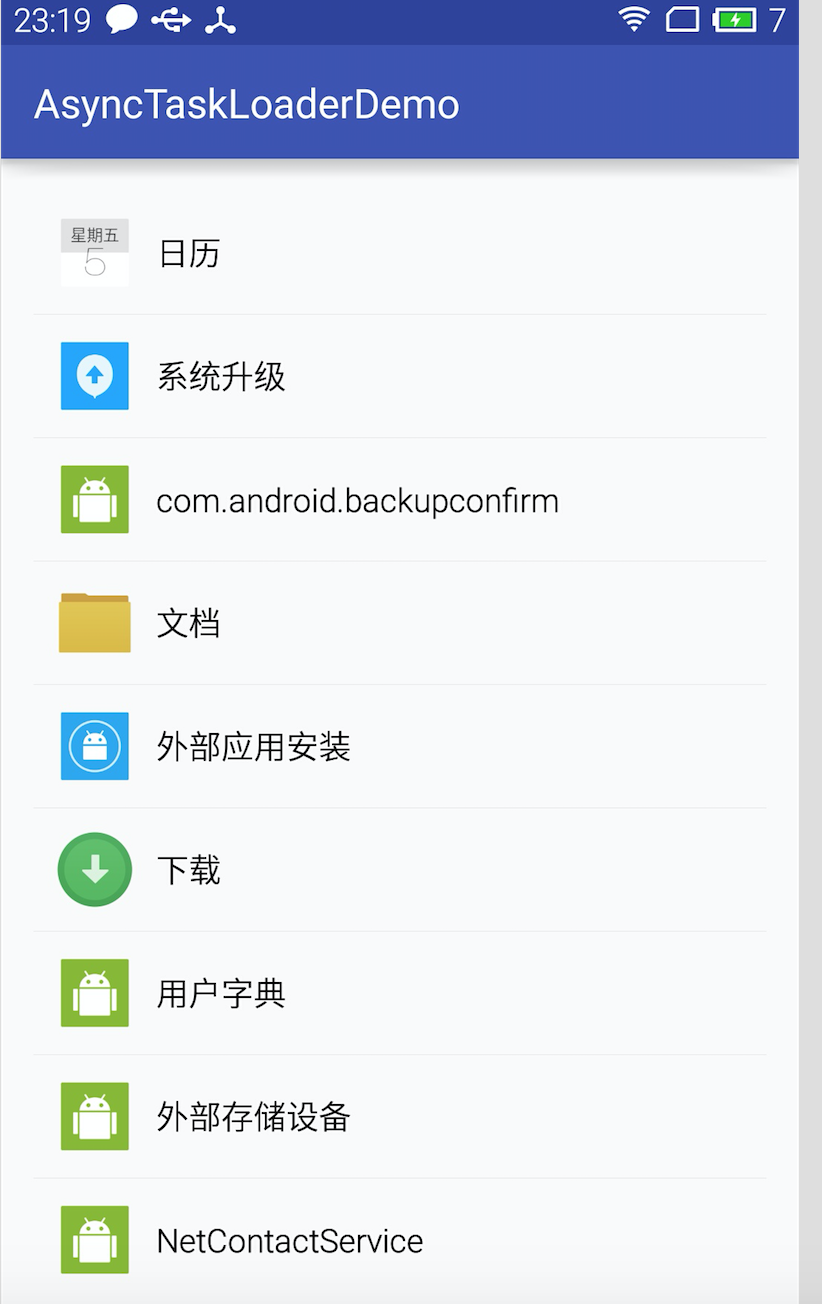AsyncTaskLoader 是在Android 3.0加入了,需要兼容更低版本可以使用V4包,AsyncTaskLoader只能在Fragment 和 Activity上使用,并且生命周期跟随Activity的onStart(),onStop()和onDestory(),内部线程使用AsyncTask和 v4包中使用ModernAsyncTask,如果使用的AsyncTask默认Executor 不会是的SERIAL_EXECUTOR(一次只能执行一个任务)。
1.AsyncTaskLoader的优缺点
优点:使用
AsyncTask执行数据请求,如果当前在Activity关闭后还没有执行完成,那么Activity的就会被持有,因而导致内存泄漏,通常我们的做法是在Activity或者Fragment中的onDestory()方法中做一些数据清理工作,以及引用持有的清理工作,而AsyncTaskLoader有生命周期的管理则会帮我们处理好这些。缺点:我们只能在
Activity或者Fragment中使用,并且不能使用AsyncTask的progress
2.Loader生命周期管理
AsyncTaskLoader最终通过LoaderManager进行生命周期管理,数据分发以及回调,在Activity中有一个LoaderManagermLoaderManager实例,我们在Activity或者Fragment中调用getLoaderManager()创建出这个实例。
mLoaderManager在Activity中生命周期的管理分别是:
1.onStart()
protected void onStart() {
if (DEBUG_LIFECYCLE) Slog.v(TAG, "onStart " + this);
mCalled = true;
if (!mLoadersStarted) {
mLoadersStarted = true;
if (mLoaderManager != null) {
mLoaderManager.doStart();
} else if (!mCheckedForLoaderManager) {
mLoaderManager = getLoaderManager("(root)", mLoadersStarted, false);
}
mCheckedForLoaderManager = true;
}
getApplication().dispatchActivityStarted(this);
}
2.performStop()
final void performStop() {
mDoReportFullyDrawn = false;
if (mLoadersStarted) {
mLoadersStarted = false;
if (mLoaderManager != null) {
if (!mChangingConfigurations) {
mLoaderManager.doStop();
} else {
mLoaderManager.doRetain();
}
}
}
3.performDestroy()
final void performDestroy() {
mDestroyed = true;
mWindow.destroy();
mFragments.dispatchDestroy();
onDestroy();
if (mLoaderManager != null) {
mLoaderManager.doDestroy();
}
if (mVoiceInteractor != null) {
mVoiceInteractor.detachActivity();
}
}
3.使用AsyncTaskLoader
1. 在Activity中实现
LoaderManager.LoaderCallbacks<D>
public class MainActivity extends AppCompatActivity implements LoaderManager.LoaderCallbacks<List<ApplicationInfo>> {
2. 实现三个方法:
@Override
public Loader<List<ApplicationInfo>> onCreateLoader(int id, Bundle args) {
//args 是getSupportLoaderManager().initLoader传过来的数据
Log.e("branch", "onCreateLoader");
return new AppListLoader(this);
}
@Override
public void onLoadFinished(Loader<List<ApplicationInfo>> loader, List<ApplicationInfo> data) {
Log.e("branch", "onLoadFinished-》 " + data);
mListApps = data;
mApplistAdapter.notifyDataSetChanged();
if (progressDialog != null) {
progressDialog.dismiss();
}
}
@Override
public void onLoaderReset(Loader<List<ApplicationInfo>> loader) {
Log.e("branch", "onLoaderReset");
if (progressDialog != null) {
progressDialog.dismiss();
}
mListApps = null;
mApplistAdapter.notifyDataSetChanged();
}
在
onCreateLoader方法中创建我们的Loader,在Activity的onCreate()或者其他地方调用方法中调用Loader init 方法,如
@Override
protected void onCreate(Bundle savedInstanceState) {
super.onCreate(savedInstanceState);
setContentView(R.layout.activity_main);
startLoad();
}
private void startLoad() {
progressDialog = new ProgressDialog(this);
progressDialog.show();
getSupportLoaderManager().initLoader(1, null, this);
}
当你想放弃上一次的数据是,可以使用
getLoaderManager().restartLoader(0, null, this);
public boolean onTextChanged(String newText) {
// Called when the action bar search text has changed. Update
// the search filter, and restart the loader to do a new query
// with this filter.
getLoaderManager().restartLoader(0, null, this);
return true;
}
这样写完我们的Loader就开始加载数据了
4.AppListLoader的实现
继承
AsyncTaskLoader,实现以下几个方法
public class AppListLoader extends AsyncTaskLoader<List<ApplicationInfo>> {
List<ApplicationInfo> mApps;
PackageManager mPm;
public AppListLoader(Context context) {
super(context);
// Retrieve the package manager for later use; note we don't
// use 'context' directly but instead the save global application
// context returned by getContext().
mPm = getContext().getPackageManager();
}
/**
* This is where the bulk of our work is done. This function is called in a background thread and
* should generate a new set of data to be published by the loader.
*/
@Override
public List<ApplicationInfo> loadInBackground() {
// Retrieve all known applications.
List<ApplicationInfo> apps = mPm.getInstalledApplications(
PackageManager.GET_UNINSTALLED_PACKAGES | PackageManager.GET_DISABLED_COMPONENTS | PackageManager.GET_META_DATA);
if (apps == null) {
apps = new ArrayList<ApplicationInfo>();
}
// Done!
return apps;
}
/**
* Called when there is new data to deliver to the client. The super class will take care of
* delivering it; the implementation here just adds a little more logic.
*/
@Override
public void deliverResult(List<ApplicationInfo> apps) {
if (isReset()) {
// An async query came in while the loader is stopped. We
// don't need the result.
if (apps != null) {
onReleaseResources(apps);
}
}
List<ApplicationInfo> oldApps = mApps;
mApps = apps;
if (isStarted()) {
// If the Loader is currently started, we can immediately
// deliver its results.
super.deliverResult(apps);
}
// At this point we can release the resources associated with
// 'oldApps' if needed; now that the new result is delivered we
// know that it is no longer in use.
if (oldApps != null) {
onReleaseResources(oldApps);
}
}
/**
* Handles a request to start the Loader.
*/
@Override
protected void onStartLoading() {
if (mApps != null) {
// If we currently have a result available, deliver it
// immediately.
deliverResult(mApps);
}
if (takeContentChanged() || mApps == null) {
// If the data has changed since the last time it was loaded
// or is not currently available, start a load.
forceLoad();
}
}
/**
* Handles a request to stop the Loader.
*/
@Override
protected void onStopLoading() {
// Attempt to cancel the current load task if possible.
cancelLoad();
}
/**
* Handles a request to cancel a load.
*/
@Override
public void onCanceled(List<ApplicationInfo> apps) {
super.onCanceled(apps);
// At this point we can release the resources associated with 'apps'
// if needed.
onReleaseResources(apps);
}
/**
* Handles a request to completely reset the Loader.
*/
@Override
protected void onReset() {
super.onReset();
// Ensure the loader is stopped
onStopLoading();
// At this point we can release the resources associated with 'apps'
// if needed.
if (mApps != null) {
onReleaseResources(mApps);
mApps = null;
}
}
/**
* Helper function to take care of releasing resources associated with an actively loaded data
* set.
*/
protected void onReleaseResources(List<ApplicationInfo> apps) {
// For a simple List<> there is nothing to do. For something
// like a Cursor, we would close it here.
}
}
5.效果图

